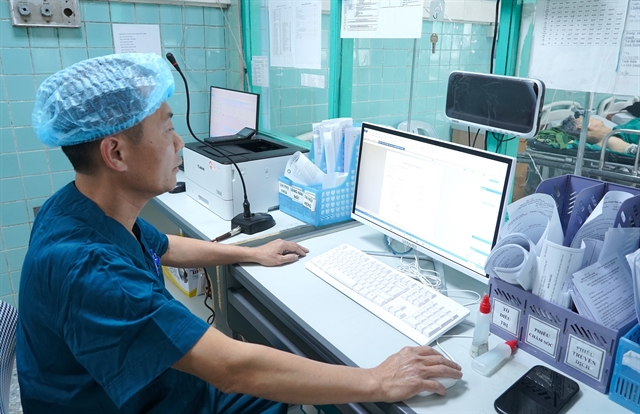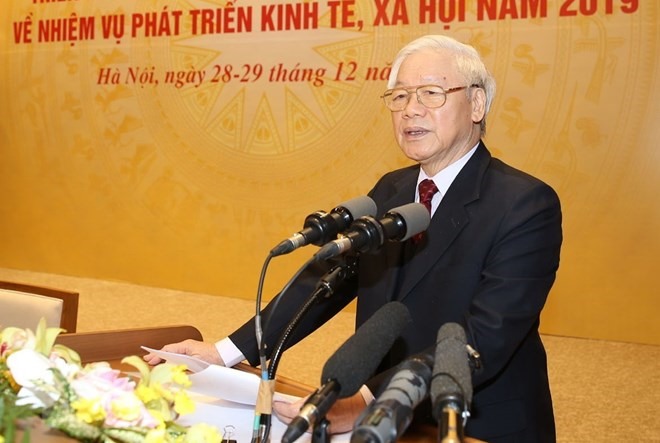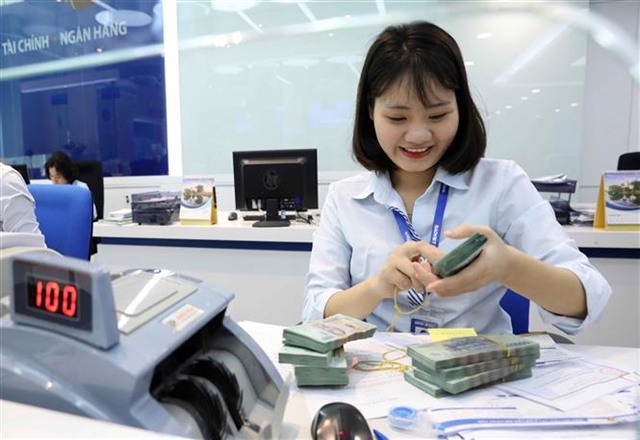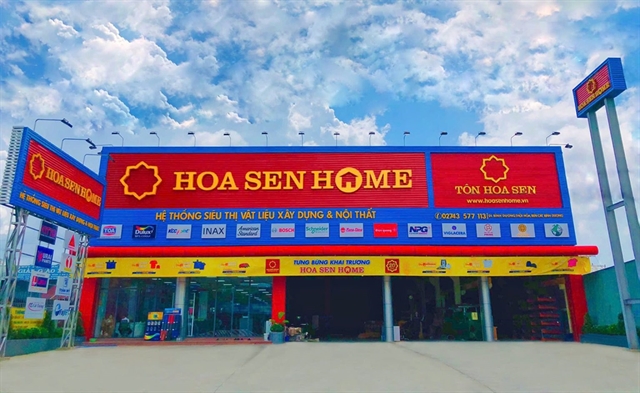 Politics & Law
Politics & Law

General Secretary of the Communist Party of Việt Nam and President Nguyễn Phú Trọng acknowledged Viet Nam’s 2018 socio-economic development achievements but warned against self-satisfaction at the Government’s meeting with localities yesterday.
 |
| General Secretary of the Communist Party of Việt Nam and President Nguyễn Phú Trọng speaks at the Government’s meeting with localities yesterday. – VNA/VNS Trí Dũng |
HÀ NỘI – General Secretary of the Communist Party of Việt Nam and President Nguyễn Phú Trọng acknowledged Viet Nam’s 2018 socio-economic development achievements but warned against self-satisfaction at the Government’s meeting with localities yesterday.
Trọng noted the country still faced many difficulties and challenges due to unpredictable regional and global developments and latent risks in the world economy, especially in finance, monetary and exports due to impacts of trade wars, along with problems in the economy and social affairs.
The Party and State leader underlined main tasks for 2019, including consolidating the macro-economy, controlling inflation, improving capacity to respond to abnormal market developments, maintaining growth pace and quality through the improvement of the business and investment environment, and raising the productivity, quality, efficiency and competitiveness of the economy.
The top leader underlined the need to speed up administrative reform, remove barriers against production and business activities, develop various types of markets, rearrange State-owned enterprises and encourage the involvement of all economic sectors at home and abroad in development investment.
It is also essential to complete socialist-oriented market economic institutions, pay more attention to cultural development and implement social progress and equality in every policy, Trọng stated.
He emphasised the necessity to strengthen defence and security, protect independence, sovereignty and territorial integrity of the nation, ensure political security, social order and safety, and step up external relations activities.
He also asked for better building of the Party and political system, as well as better personnel work to choose competent officials to leading positions.
Meanwhile, Prime Minister Nguyễn Xuân Phúc noted this year’s economic growth rate hit a decade high of 7.08 per cent, with the processing and manufacturing sector expanding by more than 12 per cent. Meanwhile, credit grew by less than 14 per cent, compared to the 17 – 18 per cent in previous years, and the mining industry contracted nearly 4 per cent.
These figures showed the growth model was switching, and the country had recorded improvement in value chains, he said.
Meanwhile, the Party Central Committee’s resolution on the private economic sector was being implemented well, with the sector recording its strongest ever development in the past two years. Additionally, more than 130,000 new enterprises were established and some 34,000 firms resumed operations in 2018, PM Phúc noted.
Deputy PM Phạm Bình Minh attributed these achievements to the Government’s actions under the motto ‘Discipline, Integrity, Action, Creativity, Effectiveness’.
The Cabinet had taken actions with consistent targets of stabilising the macro-economy, controlling inflation, creating clear and substantive changes in the implementation of strategic breakthroughs, restructuring the economy and reforming the growth model, and improving labour quality and productivity and economic competitiveness.
It had also worked to reform mechanisms and policies to remove obstacles, streamline administrative procedures and enhance the business climate, he said.
However, Minh also pointed out shortcomings of the Government, noting the proposal of mechanisms and policies remained slow, the settlement of policy loopholes had yet to meet expectations and ministries and agencies still lacked co-ordination in resolving inter-sectoral problems.
The shortcomings were attributable to the fact that leaders of some agencies hadn’t been drastic enough in their work and some officials lacked responsibility towards their duties.
PM Phúc said following this meeting, the Government would issue several resolutions so the whole administrative system, enterprises and people could work to accomplish targets set for 2019.
In 2018, Việt Nam has fulfilled and surpassed all 12 socio-economic targets. The country’s GDP growth rate exceeded 7 per cent, while GDP scale reached US$245 billion, and average per capita GDP rose to $2,580. Exports were valued at $245 billion, up 13.8 per cent year-on-year, posting a trade surplus of more than $7 billion. The consumer price index growth was maintained at 3.54 per cent. The household poverty rate decreased to 6.8 per cent.—VNS




